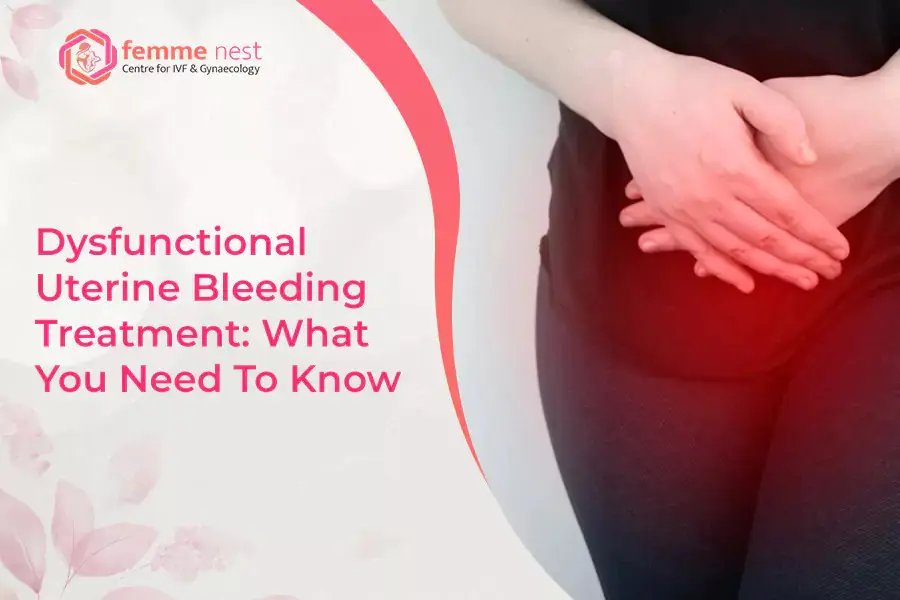Dysfunctional Uterine Bleeding, or DUB is a condition in which vaginal bleeding occurs outside of the menstrual cycle. DUB can also be triggered by certain hormonal circumstances and drugs. An imbalance in sex hormones is the most common cause of abnormal uterine bleeding. Hormone levels can be unbalanced for months or even years in girls going through puberty and women going through menopause. This results in sporadic, heavy, and spotty bleeding. Hormonal imbalances that cause DUB can also be caused by medical illnesses or adverse effects of certain medications.
What Causes Dub?
The following medical disorders are frequently associated with dysfunctional uterine bleeding:
- Polycystic ovary syndrome (PCOS): This is a type of polycystic ova (PCOS), an endocrine condition in which a woman's sex hormone production is unbalanced. This can cause an estrogen and progesterone imbalance, making the menstrual cycle unpredictable.
- Endometriosis: When the uterine lining grows outside of the uterus, such as on the ovaries, this condition develops. Heavy bleeding during periods is a symptom of endometriosis.
- Uterine Polyps: The uterus is home to these tiny growths. Polyp development is significantly influenced by the hormone estrogen, despite the fact that the etiology is unknown. DUB, including spotting between periods, might be caused by small blood vessels in the polyps.
- Uterine Fibroids: Small growths in the uterus, uterine lining, or uterine muscle are known as uterine fibroids. The etiology of uterine fibroids, like polyps, remain unknown. However, estrogen appears to play a function in their development.
- STIs (Sexually Transmitted Infections): DUB can be caused by STIs that produce inflammation, such as gonorrhoea and chlamydia. STI-related bleeding frequently happens after intercourse, when the sores become more exacerbated.
- Pregnancy: DUB can be a sign of pregnancy as early as the first trimester.
Treatment of Dysfunctional Uterine Bleeding:
There are numerous treatment options for DUB. Sometimes, particularly in the case of puberty, no treatment is necessary because the hormones normally adjust themselves. The best treatment for you will be determined by the cause of your bleeding.
- Combination oral contraceptives are the most common and straightforward treatment for dysfunctional uterine bleeding. Oral contraceptives with synthetic estrogen and progesterone are known as combination oral contraceptives. Both of these aid in the control and regulation of the menstrual cycle. Hormonal treatment can also be achieved through contraceptive treatments such as progestin IUDs and the progestin implant. These may be prescribed if you are not trying to conceive.
- If you're trying to conceive and aren't bleeding excessively, your doctor may recommend the ovulation-stimulating medication clomiphene, popularly known as clomid. By resetting your menstrual cycle, stimulating ovulation might stop persistent monthly bleeding.
- If the bleeding becomes severe and lower-dose drugs aren't working, intravenous estrogen can be given until the bleeding stops. This could be followed by a course of oral progestin to bring the hormones back into balance
- Dilation and curettage is a technique that can be used to treat heavy and persistent bleeding as well as a thicker uterine lining (D and C). This is an outpatient surgical technique that scrapes away a portion of the uterine lining.
- If your uterine cells are determined to be abnormal following treatment, your doctor may conduct another biopsy. A hysterectomy may be indicated depending on the results of the biopsy — for example, if the cells are malignant. A hysterectomy is a surgical procedure that removes the uterus completely. It is usually the last resort.
What are The Symptoms:
Apart from irregular and heavy bleeding, the other symptoms are:
- Large clots
- Bloating
- Pelvic pain or pressure
- Weakness, fatigue, and dizziness
- Fainting
- Low blood pressure
- Increased heart rate
- Pale skin
- Bleeding with a positive pregnancy test
DUB is quite normal and is unlikely to be a cause of concern. However, if you are experiencing other symptoms and are uncertain and concerned about your situation, consult your doctor at the earliest.
To book an appointment with the top gynecologist in Delhi, consult us at Femmenes



